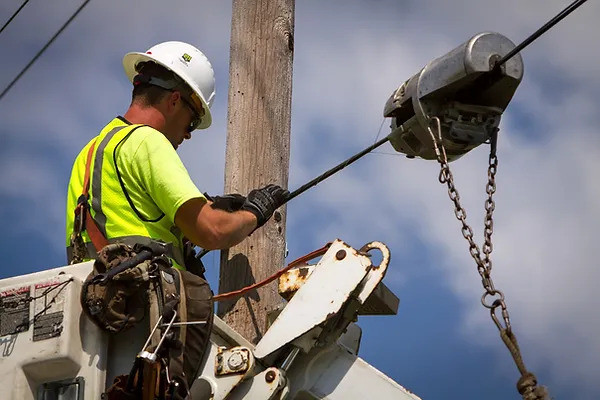When it comes to placing lashed aerial cable, choosing the right method can make a big difference in your crew’s efficiency and the quality of your installation. Whether you're tackling new construction or overlashing onto existing strand and cable, there are two tried-and-true techniques to consider: the Moving Reel Method and the Stationary Reel Method. Here's a breakdown of each approach and the gear you'll need to get the job done right.
Moving Reel Method – Ideal for New Construction
The Moving Reel Method is best used when you have clear access to move along the pole line with either a cable reel trailer or an aerial lift truck. It's perfect when there are no obstructions and you're working on new strand or overlashing onto existing lashing.
Recommended Equipment:
C Cable Lasher
For cable bundles up to 1-5/8", on 1/4" to 3/8" strand
Durable build with sealed bearings, no back-up without brake release.
J2 Cable Lasher
Handles cables up to 3" on 1/4" to 7/16" strand
Overlash-ready with internal gear drive (no belts/chains).
Towing Lanyard
Used to pull lashers and cable guides smoothly along the strand.
Aerial Cable Guide
For guiding the cable during installation.
Lashing Wire
Available in 430, 302, and 316 stainless steel.
Choose based on environment—430 for general, 302 for corrosion resistance, 316 for extreme conditions.
Lashing Wire Grip
Temporarily secures wire before tension release.
D Lashing Wire Clamp
Provides a secure wire termination.
B Cable Guards
Prevents sheath abrasion at pole attachments.
Lashing Wire Estimation Tips:
- Add 5% to length for bundles ≤ 1.5"
- Add 10% for 1.5"–3.0"
- Add 20% for > 3.0"
Stationary Reel Method – Versatile for Various Applications
The Stationary Reel Method works best when you can't move your reel—like in tight or obstructed areas. It’s used for both new cable placements and overlashing, where cable is paid off up to the strand using cable blocks.
Key Equipment:
C & J2 Cable Lashers
Same great specs as above—reliable, rugged, and built to last.
Towing Lanyard
Just as essential when pulling lashers and guides from a fixed reel setup.
Fiberglass Extension Handle Set
Includes (3) 6-ft. and (1) 3-ft. section—ideal for elevated work.
Wire Raising Tool
Securely places drop wires and cables using extension handle.
Lashing Wire Grip & D Clamp
Same as above—your go-to for anchoring and terminating lash wire.
B Cable Guards
Prevents wear at pole contact points—simple, effective protection.
Lashing Wire
Same wire, same rules—choose your grade based on weather and environment.
Final Thoughts
No matter which method you choose—Moving Reel for mobility or Stationary Reel for stability—you’ll want dependable gear that’s purpose-built for the job. GMP tools and accessories are trusted across the industry for their durability, precision, and performance in real-world conditions.
Need help selecting the right equipment? Georgia Underground Superstore has a knowledgeable team ready to guide you. Reach out or stop by any of our locations—we’ll help you gear up and get the job done right.
Find all Aerial Installation Equipment here: Aerial Installation Hand Tools and Hardware at GUS

